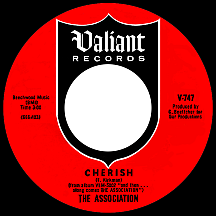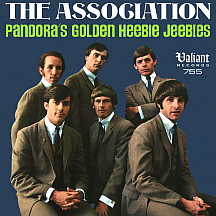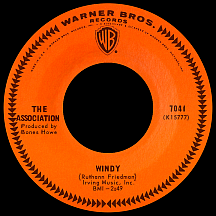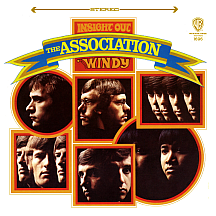THE ASSOCIATION
Their fan club had a creative name: the "Association Admiration Aggregation." Or AAA for short...and you thought those letters had something to do with cars! A little more than a year after formation, this Los Angeles-based sextet scored a hit, the double-entendre "Along Comes Mary" (as in a female love interest...or a different kind of longing for a popular inhalable herb sometimes known as "Mary Jane")...and everyone knows a little mild controversy that gets people talking can give a new act an edge on the competition. But maybe a promotional advantage wasn't necessary. The Association had talent; at the very least, their voices blended really well. And they made the most of it in those first few years, with some of the biggest hits of the era.
In late 1964, Chattanooga, Tennessee-born Gary Alexander and Salinas, Kansas native Terry Kirkman started putting the group together. Its first incarnation, The Men, had 13 members, an inflated number even by folk act standards, though it didn't prevent the diverse pop-folk-rock-jazz outfit from being hired as the house band at Hollywood's popular, seven-years-established Troubadour nightclub. Soon the number of players were whittled down to a half-dozen, all in their mid-twenties: Russ Giguere (who'd hailed from Portsmouth, New Hampshire), Brian Cole (Tacoma, Washington), Ted Bluechel, Jr. (of nearby San Pedro) and SoCal guitarist Bob Page. After throwing a few names around, Kirkman's wife suggested the Association and it was agreed upon by all six.
After auditioning for several L.A. record labels, a single appeared on Jubilee: "Babe I'm Gonna Leave You," a dark blues number penned by Northern Californian Anne H. Bredon and released by Joan Baez as a live performance in 1962 (the song became famous after Led Zeppelin included an altered version on their 1969 album debut). Page (who arranged the track with Kirkman) apparently took the song's essence to heart and dropped out, replaced soon after by Birmingham, Alabama-born Jim Yester (he and brother Jerry had formed a folk duo, The Yester Brothers, about five years earlier). The recording was good enough to interest Barry DeVorzon in signing them to his Valiant label; a midtempo cover of Bob Dylan's softly-delivered Times They Are A-Changin' heart-wrencher "One Too Many Mornings" became a minor hit on Los Angeles radio but failed to develop elsewhere.
"Along Comes Mary," composed by jazz-inclined pianist Tandyn Almer and featuring Jim Yester's lead vocal, went top ten nationally in July 1966, positioning the Association into public consciousness. Its follow-up, "Cherish," a passionate love song penned by Terry, who shared vocal harmonies with Russ, became one of the year's biggest singles, hitting number one in September. Both discs were produced by Curt Boettcher (a member of Epic Records folk quartet The GoldeBriars the previous two years), the founder of OUR Productions who helped construct hit recordings for Tommy Roe (and, a decade later, The Beach Boys). Debut album And Then Along Comes...the Association was, not surprisingly, a top seller.
Sophomore album Renaissance, released just four months later, didn't fare as well, though its back cover made a mildly humorous attempt at filling in fans as to the instruments each member specialized in. Alexander played "lead and grunt guitar and kodo," while Kirkman favored the "recorder, fluegel horn, tambourine, piano and other percussive embellishments" (word has it he excelled at more than 20 instruments). Giguere's choices were "guitar, noise and rhythm things," Yester had mastered "guitar, piano, harpsichord and bells" and Cole covered any need for "lower tonal concepts and bass honk." Bluechel had the largest bag of tricks: "drums (pig skins), door slam, percussive afterthoughts (bells, maracas, cash register)." A number of these designated instruments were implemented in the group's third Valiant single, "Pandora's Golden Heebie Jeebies," an unusual but well-produced early brush with psychedelia written and sung by Gary. An odd departure from the previous hits, it barely scratched the national top 40.
With each member taking lead vocal duties on individual songs, they stood apart from most groups of the later '60s; the harmonies by as many as all six at once became a signature sound as impressive in front of live audiences as it was on record. Grammy time rolled around and the Association picked up three nominations for "Cherish," though the redundancy of the categories (Vocal Group Performance, Rock and Roll Performance, Rock and Roll Group Recording) could have been as well served with a reduction to two categories (or even one). Still, it gave them three chances at winning...none of which panned out (The Anita Kerr Singers, The Mamas and the Papas and The New Vaudeville Band divided the spoils...does that seem plausible?).
Both sides of the next single competed for airplay in early 1967. Ballad "No Fair at All" (Jim the writer and singer) and the more uptempo "Looking Glass" (Gary's song with the whole group, Russ up front, on vocals) were both produced with exacting skill by Jim's brother Jerry; the former song was more successful, but only managed a mid-chart placement. Warner Bros. bought out the seven-year-old Valiant label at this time and the group was suddenly under the auspices of another, much larger, record company. Gary, who'd begun using his given name, Jules Alexander, left to do some traveling and get his head together musically. He was replaced by Kauai, Hawaii-born Larry Ramos (guitar and banjo), a former member of The New Christy Minstrels (side-by-side with Jerry, who'd also logged time as a Minstrel).
The first WB disc, "Windy" (main vocals by Russ and Larry), with cinematic lyrics by Ruthann Friedman ('Who's trippin' down the streets of the city?'), was climbing the charts when the group opened the Monterey International Pop Festival in mid-June '67, a three-day event featuring more than 30 acts, many of them top hitmakers, and some historically important performances by Otis Redding, Big Brother and the Holding Company, The Who and The Jimi Hendrix Experience. Shortly after the high-profile music festival, "Windy" became the Association's second number one hit. Jerry Yester had been tapped to produce the single and its corresponding LP, but Warner brass replaced him with Dayton "Bones" Howe (his track record filled with well-received outings from Frank Sinatra, Jan and Dean, The Turtles, the Mamas and the Papas and breaking hitmakers The 5th Dimension). Jerry, who'd already waxed a couple of solo singles for Dunhill, moved on and joined The Lovin' Spoonful as a replacement for the essentially irreplaceable Zal Yanovsky.
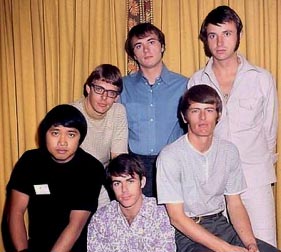
The Howe-produced Insight Out yielded another major hit, "Never My Love," a formidable serenade from composers Don and Dick Addrisi with a Terry-Larry dual lead. It climbed as high as number two in October (blocked by The Box Tops' "The Letter"). Another year, another round of Grammys; this time they landed four nominations in slightly less ambiguous categories: Best Arrangement Accompanying Vocalists or Instrumentalists (citing Howe and associates for "Windy"), Contemporary Vocal Group ("Windy"), near-duplicate category Performance by a Vocal Group ("Never My Love") and, for Insight Out, Best Contemporary Album (not Album of the Year). Defeat came via the voices of Bobbie Gentry ("Ode to Billie Joe"), the 5th Dimension (twice) and The Beatles' Sgt. Pepper's Lonely Hearts Club Band. The competition was stiffer than before and they wouldn't be getting an eighth shot at a statue, at least as far as NARAS was concerned...but hey, it's just an award, right?
Terry contributed "Everything That Touches You," featuring his and Jim's lead vocals; it reached the top ten in March of '68. An Addrisi pop jam, "Time For Livin'" (with Russ and Larry co-leads), slipped into the top 40, followed by a more rocking tune, "Six Man Band," its lyrics confronting the grind of touring (and doing your own laundry on the road). Produced by the entire group, it brought their all-inclusive concept (everyone contributes in almost every way) full circle. Its top 50 chart run (a failure when placed against their dominant position of the previous two years) begged the question: had they achieved everything they set out to do? The answer: no! With the return of Jules Alexander, future success was viable. Warner Bros. heads agreed. Jim's theme from the film "Goodbye Columbus," starring newcomer/temporary sensation Ali MacGraw, seemed to be a step in the right direction but performed poorest of any single since '65 despite the film's positive reviews and strong box office figures. The song's main claim to success was a Golden Globe nomination (the award went to Rod McKuen's "Jean" from The Prime of Miss Jean Brodie).
"Under Branches" (Alexander wrote it) was a Hot 100 no-show. John Boylan (who'd helmed some of Rick Nelson's recent sessions) produced most of the band's 1969 material; the Boylan-penned "Yes, I Will" got the cold shoulder. Jules' "Dubuque Blues" made a brief showing on the Cash Box chart. Then the 1960s ended. The band continued the writing-and-lead-vocal merry-go-round approach for two more years; their Valiant and Warner output totaled eight albums, including an ongoing, top-selling greatest hits package. In 1970, Russ Giguere was replaced by keyboard player Richard Thompson. He, in turn, stepped aside for Rick Ulsky a few years later. The group signed with Columbia Records in early '72, their most notable single a serviceable remake of the Lovin' Spoonful's half-decade-old "Darling Be Home Soon."
When bassist Brian Cole died from a heroin overdose shortly before his 30th birthday in August of '72, the group went into a temporary tailspin. Jim Yester, Ted Bluechel and Larry Ramos stayed the course with a changing lineup of newer members. "Names, Tags, Numbers and Labels," an Albert Hammond song issued on Hammond's Mums label, got them back on the airwaves and the charts (mainstream and Easy Listening) in 1973. They made a couple of singles for RCA in '75 before splitting. A few years later, founders Terry Kirkman and Jules Alexander returned and began appearing in "oldies" concerts with other original members participating from time to time, a well-received routine that continued for decades and even included second-generation Association offspring (Brian's son Jordan Cole). One final radio single supplemented the band's repertoire in 1981: "Dreamer," a Moon Martin song recorded for Elektra Records with producer Bones Howe, was a top 20 Adult Contemporary hit in 1981.
NOTABLE SINGLES:
- Babe I'm Gonna Leave You - 1965
- One Too Many Mornings - 1965
- Along Comes Mary - 1966
- Cherish - 1966
- Pandora's Golden Heebie Jeebies - 1966
- No Fair at All /
Looking Glass - 1967 - Windy - 1967
- Never My Love /
Requiem for the Masses - 1967 - Everything That Touches You - 1968
- Time for Livin' - 1968
- Six Man Band - 1968
- Enter the Young - 1968
- Goodbye Columbus - 1969
- Under Branches - 1969
- Yes, I Will - 1969
- Dubuque Blues - 1969
- Just About the Same - 1970
- Along the Way - 1970
- P.F. Sloan - 1971
- Thats Racin' - 1971
by the Association featuring Brian Cole - Darling Be Home Soon - 1972
- Names, Tags, Numbers and Labels - 1973
- One Sunday Morning - 1975
- Dreamer - 1981


